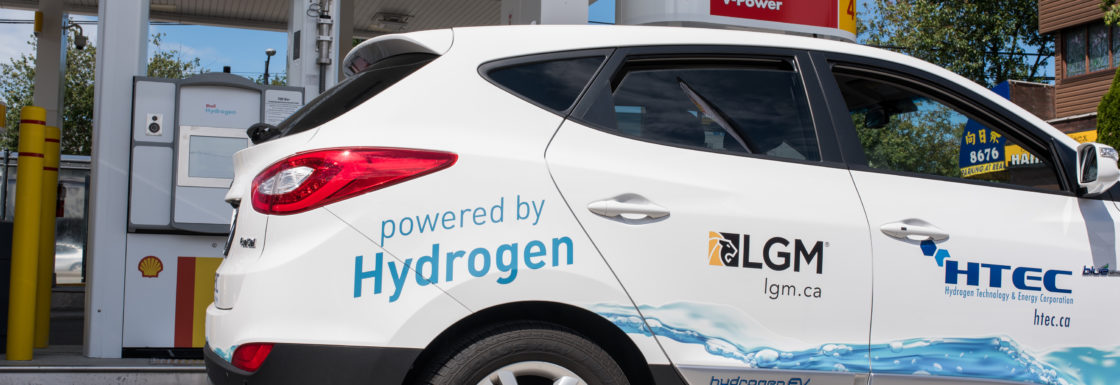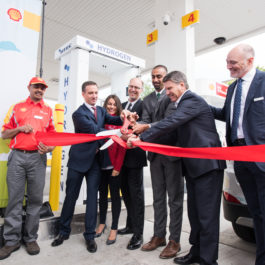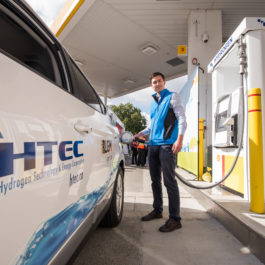HTEC (Hydrogen Technology & Energy Corporation): Retail Hydrogen Network

Projects Sponsor
Charge ‘er up; Retail Hydrogen Network finds the right way to step on the gas
Hydrogen Fuel Cell Electric Vehicles (FCEVs) eliminate vehicle tailpipe emissions, allow for highly efficient use of energy and enable a number of low-carbon-intensity transportation fuel supply pathways. Obviously, however, in order to reap these benefits every vehicle is going to need a place to refuel with reasonably priced, low-carbon-intensity hydrogen (H2). Over the next five years, thousands of H2-powered vehicles will roll onto North American roads to meet zero-emission-vehicle and climate-change mandates, but they won’t roll very far if there’s nowhere for them to fuel up.
If that sounds overly ambitious, it helps to remember that when Canada’s first gas station opened in Vancouver in 1907, the country wasn’t exactly overflowing with cars, but demand for gasoline was increasing and it made sense to build a fueling station to support a growing network of automobiles. The same is true today: infrastructure needs to be in place to support FCEV rollouts.
Recognizing that ease-of-fueling-up is key to making H2-powered vehicles a success, Hyundai Canada’s CEO, Don Romano, threw down a challenge: build hydrogen fueling infrastructure in British Columbia and Hyundai will bring more fuel cell electric vehicles.
Enter HTEC Hydrogen Technology & Energy Corporation (HTEC), whose agile and passionate team of 20 has world-leading hydrogen and fuel-cell sector experience and supply-chain knowledge, along with a proven track record of success in developing and managing more than $45M in hydrogen projects. HTEC applied their experience in providing project development, management, engineering, procurement, construction, and operations, and marketing for hydrogen fuel supply solutions and in June 2018, they opened Canada’s first retail H2 fueling station. It is to be part of an ambitious station network HTEC is building in Greater Vancouver and Victoria. The first six stations in the network will be in operation in 2020 and will enable the deployment of the first 1,000 zero-emission H2 FCEVs in BC.
Initial steps before launching the project included market research into vehicle-deployment drivers, including the likelihood of the introduction of Zero Emission Vehicle mandates in BC and other Canadian jurisdictions. California’s ZEV mandate has supported the market adoption of hydrogen FCEVs and today California has 41 H2 stations open, with 22 more in the works and a goal of 200 stations by 2025. These stations support the 7,500 FCEVs currently on the road, a number that goes up weekly.
California’s vision is 1,000 stations and one million FCEVs by 2030 and yet despite their existing success, public perception is a challenge HTEC must manage at every step. Skepticism about the viability of H2 for transportation, often fueled by fervent proponents of one transportation solution over another is always an issue, as are public concerns about H2 safety, usually the result of fearmongering and misinformation. As a small company, with limited resources, HTEC is unable to launch campaigns to respond, but the team does what it can on a one-to-one basis and in support of HTEC partners’ efforts.
HTEC also conducted research evaluating ideal station locations, traffic patterns, and identifying potential early adopters of FCEVs. Every station in the BC network involves a development process that can take up to a year, during which HTEC works with automakers to establish demand and load for each station, identifies partners, secures funding from multiple sources, finds appropriate station locations, builds the business case, and puts the appropriate contracts in place. When this is done, HTEC moves into station engineering and design, permitting, and equipment procurement, which can take approximately eight months. Construction takes about four months, and station commissioning about one month.
The biggest single impact to date? FCEVs are coming to British Columbia. In March 2019, Hyundai Canada launched its second-generation FCEV, the NEXO. Initial vehicles are in the Modo car-sharing service in BC, allowing more drivers to experience H2 FCEVs first-hand. Early adopters are also beginning to receive their NEXO vehicles. This May, Toyota Canada announced its Toyota Mirai FCEV will be available for purchase by fleet operators at 12 Vancouver area Toyota dealerships, beginning in July.
In station one’s first year of operations, HTEC has filled vehicles with almost 1,000 kilograms of hydrogen, in 427 fills. This has reduced over 20 tonnes of tailpipe GHG emissions. It’s early days and HTEC will be reporting in more detail on the specific impact of hydrogen as a transportation fuel as more stations open and more FCEVs roll onto roads. For now, HTEC continues its efforts to hydrogen fuel the drive to help BC and Canada meet their clean air and carbon emission reduction targets.
HTEC and the project has been an early leader of incorporating the Low Carbon Fuel Regulations to hydrogen fuel supply and infrastructure. The experience in the project has helped support changes to similar legislation in California that is enabling more hydrogen fuel infrastructure development. Hard to think of a better way to step on the gas.















